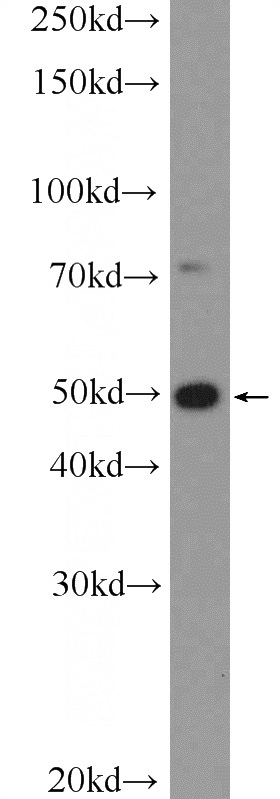-
Product Name
PDX1 antibody
- Documents
-
Description
PDX1 Rabbit Polyclonal antibody. Positive WB detected in BGC-823 cells, PC-3 cells. Observed molecular weight by Western-blot: 35-40 kDa
-
Tested applications
ELISA, WB
-
Species reactivity
Human; other species not tested.
-
Alternative names
Glucose sensitive factor antibody; GSF antibody; IDX 1 antibody; Insulin promoter factor 1 antibody; Insulin upstream factor 1 antibody; IPF 1 antibody; IPF1 antibody; Islet/duodenum homeobox 1 antibody; IUF 1 antibody; IUF1 antibody; MODY4 antibody; PDX 1 antibody; PDX1 antibody; STF 1 antibody
-
Isotype
Rabbit IgG
-
Preparation
This antibody was obtained by immunization of Peptide (Accession Number: NM_000209). Purification method: Antigen affinity purified.
-
Clonality
Polyclonal
-
Formulation
PBS with 0.02% sodium azide and 50% glycerol pH 7.3.
-
Storage instructions
Store at -20℃. DO NOT ALIQUOT
-
Applications
Recommended Dilution:
WB: 1:200-1:2000
-
Validations

BGC-823 cells were subjected to SDS PAGE followed by western blot with Catalog No:113640(PDX1 Antibody) at dilution of 1:600
-
Background
Pancreatic duodenal homeobox-1 protein (PDX-1), also designated insulin promoter factor (IPF1), insulin upstream factor 1 (IUF1), somatostatin trans-activating factor-1 (STF-1) and glucose-sensitive factor (GSF), is a 282 amino acid homeodomain-containing transcription factor present in pancreatic beta-cells. PDX-1 is a key regulator of pancreatic islet development and insulin gene transcription in beta-cells. PDX-1 is expressed in all cells at the early stages of development and is mainly restricted to the pancreas and duodenum in adult. HNF-3b, HNF-1a and SP1 positively regulate the PDX-1 enhancer element. PDX-1 is also regulated by glucagon-like peptide through activation of adenylyl cyclase, which results in an increase in intracellular cAMP activity. The increased levels of cAMP, and the resulting activation of PKA, lead to an increase in PDX-1 transcription and translocation of the protein to the nuclei of beta-cells. PDX-1 binds to the sequence C(C/T) and can heterodimerize with PBX. PDX-1 is phosphorylated by the SAPK2 pathway under high glucose concentrations. Mutations in the PDX-1 gene can cause maturity-onset diabetes of the young and pancreatic agenesis.
Related Products / Services
Please note: All products are "FOR RESEARCH USE ONLY AND ARE NOT INTENDED FOR DIAGNOSTIC OR THERAPEUTIC USE"
